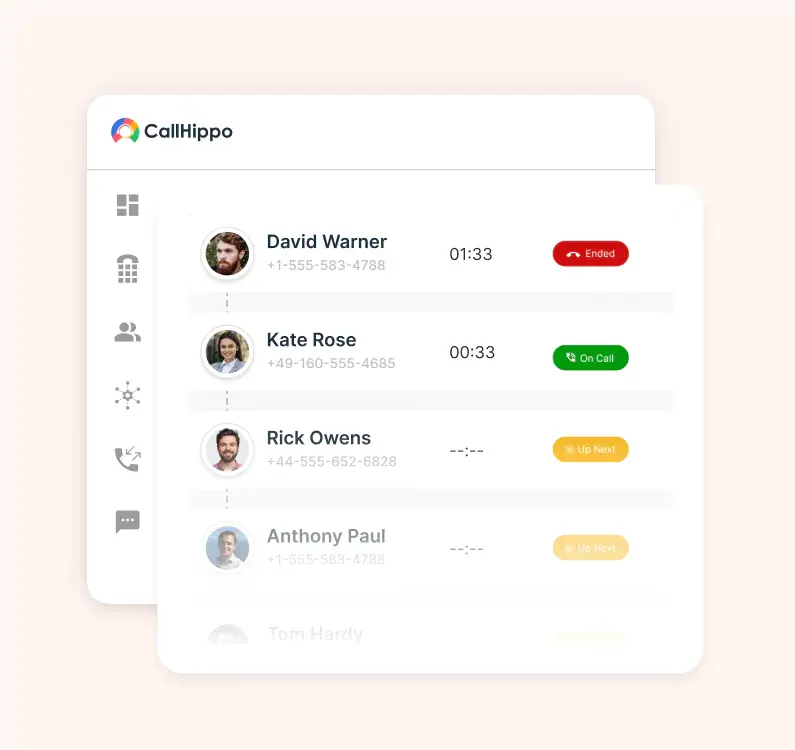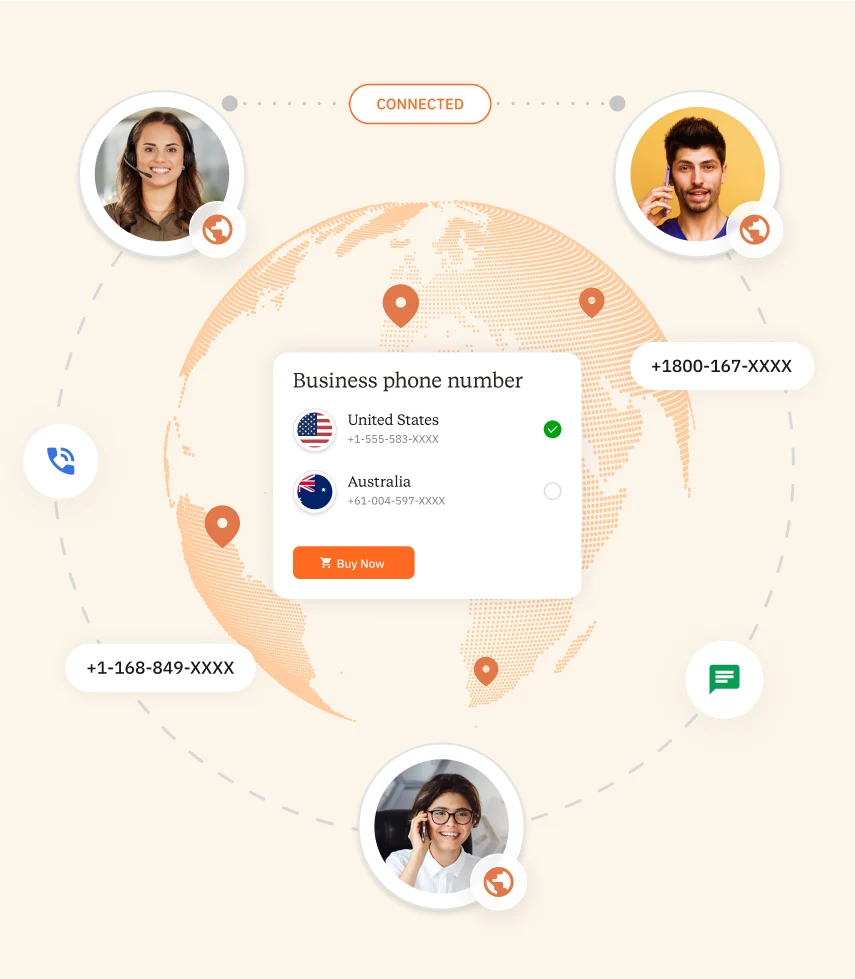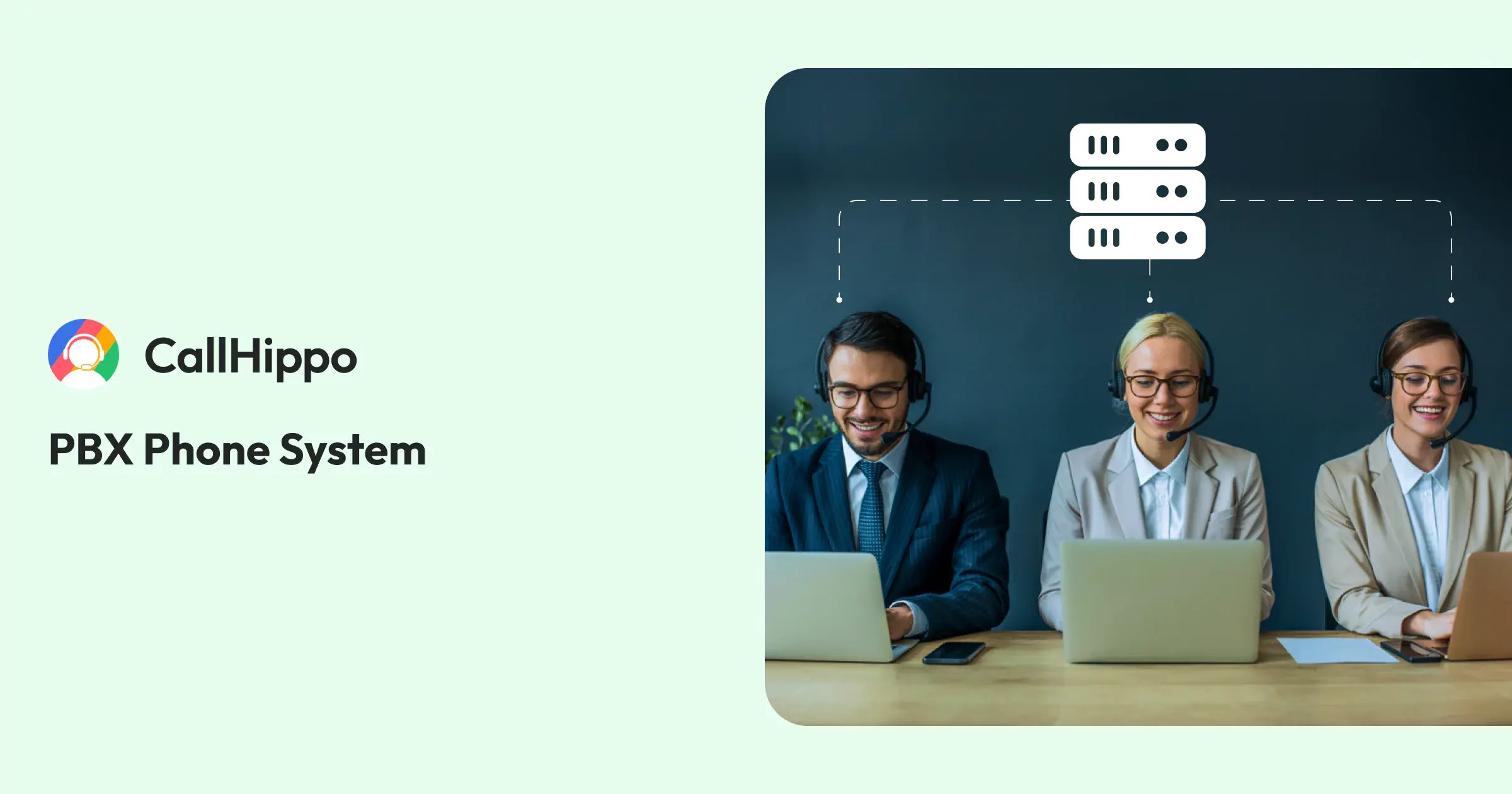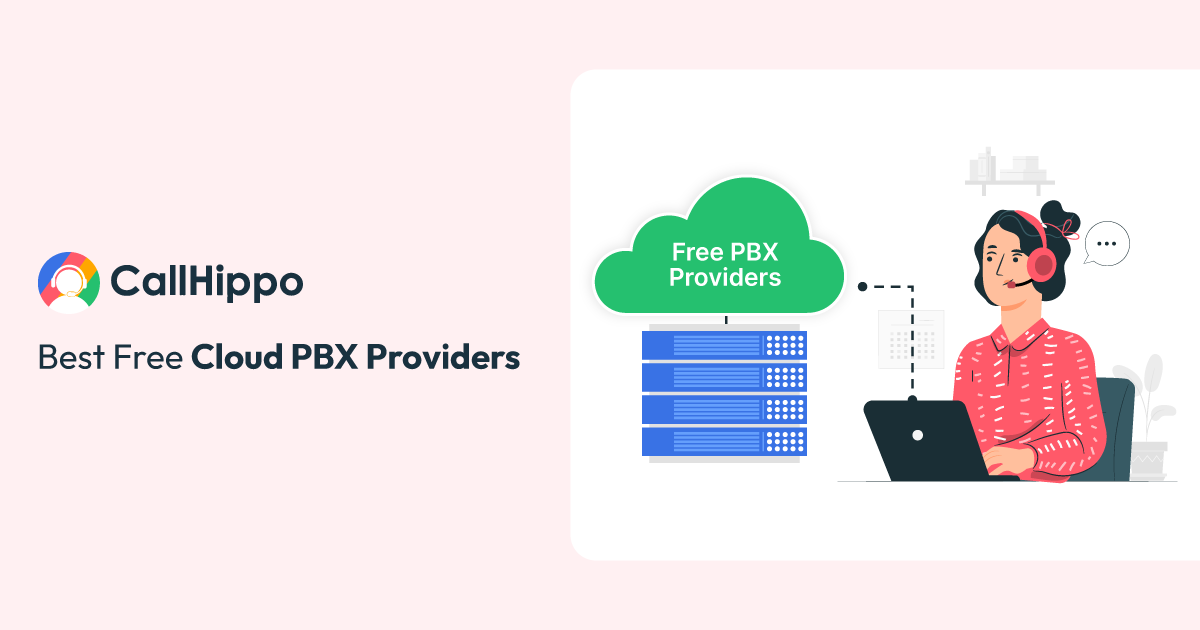Cloud PBX Phone System
Managing a business means dealing with calls coming in from everywhere, texts that need quick responses, and messages scattered across different platforms. CallHippo’s cloud PBX phone system brings it all together so you can focus on your business.
- Keep communication flowing with smart call forwarding and routing.
- Handle calls, texts, and voicemails from one central hub.
- Stay in touch at the office or at home.

What Is Cloud PBX?
A cloud PBX operates through remote servers rather than requiring physical office infrastructure. This system enables teams to conduct calls using mobile devices, route communications appropriately, access voicemails, and maintain conversation records without managing substantial on-site equipment.
Cloud PBX providers handle all technical operations and maintenance, delivering consistent updates and reliable performance without internal administrative burden. This configuration particularly benefits organizations requiring workforce mobility.
A cloud-based IP PBX maintains seamless connectivity, offers cost-effective operations, and preserves the professional standards that clients expect from business communications.
What Are The Key Benefits Of Cloud PBX?
A cloud-based PBX makes communication easier on everyone: your team, your budget, and your customers, who actually reach the right person on the first try.
Your team can take calls and stay productive from anywhere with mobile apps that work with any cloud-based PBX for small businesses.
Forget about spending upfront on equipment! The cloud PBX solutions just need your existing internet connection, and there are minimal upgrade charges.
The best cloud PBX providers keep your calls running smoothly with backup systems that actually work when you need them.
Change settings, add users, or update numbers with a few clicks. You don’t need technical expertise to manage your cloud PBX system.
You get the excellent features: smart call routing, detailed reports, and professional voicemail. It is standard with most cloud PBX services.
A cloud phone system has fast deployments. It can be ready immediately after setup instead of your team waiting weeks for installation appointments.
What Are The Top Features Of Cloud PBX?
A cloud PBX system comes packed with features that actually make your work easier instead of more complicated.
Make as many phone calls as you need without watching the meter. Top cloud PBX systems offer unlimited calling options to their customers.
Greet callers professionally and get them to the right person or department. Minimize transfers, reduce handling time, and provide reliable, professional experiences consistently.
Capture important conversations for training new hires and staying compliant. Help train agents, identify patterns, and make them more comfortable taking calls.
See how busy your team really is, where the bottlenecks happen, what's working well with cloud PBX phone solutions, and make the necessary improvements.
You can send quick updates or appointment reminders right from your cloud-based PBX phone system instead of switching between multiple apps.
Check messages from your email or phone app. No more being tied to your desk to stay on top of communications.
With a cloud PBX system, know who's calling before you pick up, and make sure your number shows up professionally when you call out.
Keep the phone number your customers already know when you switch to a cloud-based PBX for small businesses. It is simple with cloud PBX systems.
What Are The Different Types Of PBX?
Selecting an appropriate phone system represents a critical business decision, as organizations require tailored communication solutions to support their operations effectively.
- Cloud PBX
Cloud PBX operates through an internet-based infrastructure that adapts to business growth. Service providers handle all technical maintenance and updates, enabling teams to focus on customer service and business objectives. - Traditional PBX
Traditional PBX utilizes physical equipment and dedicated phone lines installed on-site. This established traditional phone system approach delivers exceptional reliability and complete system control. - IP PBX (On-Premise IP PBX)
IP (Internet Protocol) PBX combines modern internet calling technology with local system management. Organizations gain access to advanced communication features while maintaining direct infrastructure oversight. - Virtual PBX
Virtual PBX provides essential business phone features through a simplified cloud platform. IP phones deliver professional communication capabilities without complex system requirements. - Hybrid PBX
Hybrid PBX integrates on-site equipment with cloud-based services, creating a flexible foundation that supports gradual technology transitions.

Pricing
- 1 Free Phone Number
Toll-free number not included.
- Free WhatsApp Business API
- Voicemail
- Click To Dial
- AI Global Connect
Identify phone number's timezone before a call
- SMS (Text messages) & MMS
- Everything in Basic + Telephony
-
Unlimited Minutes (Includes Both Landline & Mobile Calling)
Free minutes are shared by all account users. Calling on special and premium numbers are excluded.
- 100 SMS (Text Messages)
Standard A2P charges apply.
- Basic Report Analytics
- Everything in Starter +
-
Unlimited Minutes (Includes Both Landline & Mobile Calling)
Free minutes are shared by all account users. Calling on special and premium numbers are excluded.
- 500 SMS (Text Messages)
Standard A2P charges apply.
- Call Recordings
- AI Reports / Analytics
Smart reports that summarize user & call activity.
- Everything in Professional +
-
Unlimited Minutes (Includes Both Landline & Mobile Calling)
Free minutes are shared by all account users. Calling on special and premium numbers are excluded.
- 1000 SMS (Text Messages)
Standard A2P charges apply.
- Dedicated Account Manager
- Custom Integrations
- Single Sign On (SSO)
Securely log into multiple apps with one set of credentials.
How Does A Cloud PBX Work?
Cloud PBX systems transfer phone systems from physical office equipment to secure internet servers managed by service providers. Instead of maintaining switches, servers, and cables in office spaces, everything operates through the cloud, providing enhanced flexibility, reliability, and simplified management.
The system functions by hosting all communication infrastructure remotely, enabling access through internet connections and various devices while eliminating traditional equipment limitations.
Call Initiation
When customers call your business number, their calls go straight to your provider’s cloud servers instead of old-fashioned office equipment. These servers act as your phone system’s brain, so you don’t need to buy or maintain heavy PBX boxes that used to sit in your office closet.
Call Processing
As soon as calls reach the cloud, the system follows the rules you’ve set up for your business. It might ring everyone on your sales team at the same time, send calls to mobile phones after you close for the day, or put callers in a friendly waiting queue when your team is helping other customers. This organized approach means every call gets handled properly, even when you’re swamped.
Call Routing
Next, the Cloud PBX figures out exactly where incoming calls should go. It makes these decisions based on who’s available, which department the caller needs, and whether they’ve called before. The system can even recognize returning customers and connect them right back to the same person who helped them last time.
Voice Conversion
Behind the scenes, the system turns regular voice calls into secure digital information that travels through your internet connection. This happens automatically and smoothly. You and your customers just experience a normal, clear phone conversation without noticing all the technology working in the background.
Call Delivery
Your team members can manage calls using whatever device best fits their work style: internet-connected desk phones, computer software, or mobile applications that enable business communications from any location. This adaptability becomes particularly valuable for remote employees, frequent travelers, and teams that alternate between home and office settings.
Ongoing Management
Your service provider handles all technical operations, including system maintenance, security patches, capacity scaling as your organization grows, and automated deployment of new capabilities. Adding telephone service for new hires becomes a straightforward administrative process rather than scheduling technician visits to your facility.
You eliminate concerns about equipment failures, server malfunctions, or complicated installation requirements. Your provider manages these technical responsibilities while you concentrate on core business activities.
Common Challenges Of Cloud PBX
Actual deployment often reveals obstacles that marketing materials don’t fully address, making strategic planning and risk mitigation essential.
Complete Internet Reliance
Your communication infrastructure depends entirely on internet connectivity, meaning network failures eliminate all telephony capabilities. Numerous organizations have experienced complete communication shutdowns during internet service interruptions, preventing customer interactions, order processing, and essential operations. Your telephone system reliability becomes directly linked to your internet service performance and stability.
Call Quality Fluctuates Unpredictably
Voice quality varies based on network conditions such as available bandwidth, connection delays, and data transmission issues. Important business conversations and video conferencing can suffer from audio delays, echo problems, or choppy sound when internet traffic increases or network performance drops. These quality issues often surface during busy business hours when reliable communication matters most.
Security Considerations Expand
Internet-based telephony creates additional attack vectors for cybercriminals. Malicious actors may exploit VoIP infrastructure to penetrate business networks, monitor confidential communications, or generate substantial unauthorized charges. Your protection relies on your provider’s security protocols combined with your internal network safeguards.
Cost Structures Include Variables
Although base subscription rates appear reasonable initially, supplementary expenses accumulate through advanced features, international connectivity, bandwidth enhancements, or temporary user increases. Your preliminary budget seldom reflects total operational expenses after incorporating necessary add-ons and real usage requirements.
Vendor Dependency Limits Flexibility
Changing providers after deployment requires substantial effort and risks service disruption. Your organization becomes committed to particular platforms and functionality with minimal negotiation leverage for pricing or service modifications. Provider policy changes or performance deterioration can affect operations without readily available alternatives.
Cloud PBX vs Traditional PBX
The fundamental distinctions between cloud PBX and conventional PBX systems represent different organizational philosophies. Your selection depends on whether your organization requires a communication infrastructure that accommodates contemporary business methodologies or prefers maintaining direct oversight of physical equipment and systems.
| Feature | Cloud PBX | Traditional PBX |
|---|---|---|
| Implementation | You need just an internet connection and can have everything working within hours, without dealing with bulky equipment or waiting for technicians. | You'll need to install physical servers, run cables throughout your office, and set up hardware systems, which usually takes weeks and requires IT help. |
| Investment Structure | You pay a simple monthly fee per person with clear pricing and no surprise repair bills down the road. | You'll face a big upfront cost for all the equipment, plus ongoing expenses when things break or need upgrading. |
| Business Growth | Adding new people is instant; whether you're hiring one person or an entire department, they're ready to go immediately. | You're limited by what your current equipment can handle, and growing means buying more hardware and waiting for installation. |
| Workplace Flexibility | Your staff can take business calls from anywhere using their computers, phones, or tablets, making remote and hybrid work simple. | Everyone's tied to their office desk phones, and working remotely requires expensive add-ons that don't work as well. |
| Functionality | You get powerful tools like voicemail sent to email, call reports, smart answering systems, and connections to your business software. | You're limited to basic calling features like transferring calls and internal extensions, without modern business tools. |
| Remote Operations | Perfect for teams spread across different locations, keeping everyone connected with the same call quality no matter where they work. | Built for everyone working in the same building, with limited and costly options for remote team members. |
| System Integration | Connects easily with your CRM, customer service platforms, and other business software you already use every day. | Works by itself without connecting to other systems, so you manage your phones and business tools separately. |
| Technical Management | Your provider handles all the behind-the-scenes work—updates, security patches, and keeping everything working smoothly. | You need IT staff or expensive service contracts to maintain, update, and fix problems with your system. |
| Service Reliability | Built with backup systems that automatically take over if something goes wrong, keeping your business phones working reliably. | When your office equipment fails, your entire phone system goes down until someone can physically fix it. |
Cloud PBX And Hosted PBX
The main difference between cloud PBX and hosted PBX comes down to how much control and flexibility you want over your business communications versus how much you’re willing to depend on your provider’s specific setup and processes.
| Feature | Cloud PBX | Hosted PBX |
|---|---|---|
| Hosting | Everything works online through your provider's data centers, so you don't need any equipment taking up space in your office. | Runs on your provider's servers, but you might need some local equipment or setup work at your location. |
| Control | You handle most settings yourself through a simple online dashboard, making changes whenever you need to. | You can adjust basic settings, but bigger changes often mean calling your provider's support team for help. |
| Scalability | You can add new people right away, which works great whether you're a small business or a large company that needs to grow quickly. | You can expand your system, but growth might depend on what your provider's infrastructure can handle and your plan's limits. |
| Features | You get all the business tools you need, including smart auto-attendants, advanced voicemail, detailed call reports, and flexible call forwarding. | Basic calling features come standard, but you might pay extra for more advanced business tools. |
| Cost | You pay a clear monthly rate per person with straightforward pricing and no hidden charges for standard features. | Usually affordable with good base pricing, but costs can go up when you add premium features. |
| Technical Support | Your provider takes care of all the technical work: maintenance, updates, and fixing problems, so you don't need IT staff to manage your phones. | Your provider handles the servers and basic upkeep, but some technical problems might take longer to resolve or need manual support. |
| Deployment Speed | You can have everything running within hours, with immediate access to all features and capabilities. | Setup usually takes longer because of your provider's specific processes and any local equipment coordination. |
| Reliability | Built with backup systems that automatically keep your service running smoothly and your phones working consistently. | Generally reliable service, but how well your system performs depends on your specific provider's infrastructure and capacity. |
| Best For | Businesses that want maximum flexibility, strong remote work support, and prefer managing their communications without technical complications. | Companies that want professional phone service and are comfortable relying on their provider for system management and technical decisions. |
Steps to Implement Cloud PBX in Your Business
Here are the steps to implement cloud PBX in your business easily:
Assessing Business Needs
A thorough needs assessment forms the foundation for successful cloud PBX implementation. Organizations must evaluate current communication patterns, technical requirements, and operational workflows before selecting providers or configuring systems.
Begin with a comprehensive analysis of existing call volumes and usage patterns. Document peak calling periods, seasonal fluctuations, and concurrent call requirements to determine appropriate service capacity. Many businesses underestimate their actual usage, leading to inadequate bandwidth allocation or insufficient user licenses during busy periods.
Choosing The Right Provider
Provider selection determines service quality, support experience, and long-term operational success more than specific features or initial pricing structures. Comprehensive evaluation during this phase prevents costly switching decisions later.
Research provider reputation through multiple independent sources beyond marketing materials and sales presentations. Industry publications, user communities, and professional networks often provide more balanced perspectives on actual service delivery and support responsiveness. Focus particularly on feedback from organizations of a similar size, industry characteristics, and usage requirements.
Setting Up Users & Extensions
Strategic user configuration prevents operational confusion and ensures employees can accomplish required tasks efficiently. Thoughtful setup during this phase reduces training requirements and improves system adoption rates.
Design extension numbering schemes that accommodate current staff plus reasonable growth projections while maintaining logical organization patterns. Consider departmental groupings, functional roles, or seniority levels when assigning numbers, leaving appropriate gaps for expansion within each category. Intuitive numbering reduces user confusion and training requirements.
Training Employees
Training quality frequently determines implementation success more than technical system capabilities or feature sophistication. Even excellent platforms fail when users cannot effectively operate new workflows and functionality.
Organizations should prioritize training for power users who will function as internal resources for ongoing questions and troubleshooting support. Receptionists, administrative personnel, and technically capable employees warrant comprehensive training prioritization, as they will subsequently assist colleagues throughout the transition process.
The confidence and proficiency demonstrated by these initial users significantly influence how remaining team members perceive and embrace the new technology platform.
Testing & Monitoring
Thorough testing prior to complete operational deployment enables organizations to identify potential complications while they remain controllable and minimally disruptive to business operations. Insufficient testing frequently results in service interruptions during critical business activities, potentially compromising customer relationships and operational effectiveness.
Organizations must evaluate all scenarios encountered during regular business operations, including high-volume usage periods, emergency response procedures, and significant yet infrequent operational workflows. Testing should replicate actual operating environments rather than optimal conditions to reveal system vulnerabilities before they affect customer service or business operations.
Get Started with a Business Phone Number You Can Trust
Learn how to quickly buy your virtual business phone number with CallHippo and hear from satisfied customer about how we improved their communication and customer experience.


“Thanks to the CallHippo team, we were able to resolve a tough issue with flagged phone numbers. As an EdTech startup, outbound calls are crucial for us. CallHippo’s solution not only improved our attestation score but also improved our answer rates and overall customer experience.”
Frequently Asked Questions
-
VoIP is the technology for internet calling; cloud PBX is a complete business phone system using VoIP technology.
-
Most providers charge $15-35 per user monthly for standard plans, with enterprise features costing more for larger businesses.
-
Traditional PBX uses physical equipment, IP PBX works on-premise with the internet, and cloud PBX operates entirely online.
-
Any business wanting professional phone features, remote work flexibility, and easy management without maintaining physical equipment.
-
Yes, it eliminates equipment costs, reduces maintenance expenses, and offers predictable monthly pricing with professional features included.
-
Yes, hybrid solutions let you gradually migrate by connecting your current equipment with cloud-based features and services.


